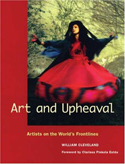Emergency Readiness, Response, and Recovery
While artists and arts organizations often play an active role in the healing process after disasters, the frequency of 21st century emergencies has also demonstrated that the arts and culture sector itself is highly vulnerable. Time and time again, creative careers and creative economies have suffered great loss and devastation, which has often included severe damage of unique cultural artifacts and venues. Cultural workers and arts organizations are generally underprepared for emergencies, and underserved when disasters strike.
National Coalition for Arts’ Preparedness and Emergency Response
The Coalition is a cross-disciplinary, voluntary task force involving over 20 arts organizations (artist/art-focused organizations, arts agencies and arts funders) and individual artists, co-chaired by CERF+ (Craft Emergency Relief Fund + Artists’ Emergency Resources) and South Arts. Coalition participants are committed to a combined strategy of resource development, educational empowerment, and public policy advocacy designed to ensure that there is an organized, nationwide safety net for artists and the arts organizations that serve them before, during and after disasters. Grantmakers in the Arts (GIA) members active with the Coalition have been meeting at GIA’s annual conference to guide and educate foundations, arts agencies, art service organizations and corporate grantmakers interested in becoming more emergency ready and effective in their emergency relief efforts and grantmaking. Click here for the executive summary of the Coalition’s 2014-2020 plan.
Recommended Resources & Publications
If you are currently working in an area affected by an emergency, the Coalition’s Essential Guidelines for Arts Responders is your first step.
— P. Kingfisher
The current economic climate has forced many nonprofit arts organizations to confront underlying issues. Tensions mount, dollars are scarce, and unresolved weaknesses or fissures often grow. We have seen heartening examples of artists, donors, audiences, and funders rallying to support the art and organizations that they love. In some cases, streamlined, more focused organizations are forging ahead with renewed determination. But in other cases, the economic downturn may herald the time to close the doors.
Read More...— Foundation President
On May 12th, more than 60 artists and creative organizers engaged in civic participation, community development, education, social justice activism, and philanthropy came together for a White House briefing on Art, Community, Social Justice, National Recovery.
Read More...The Paul G. Allen Family Foundation, 4Culture, the Seattle Foundation and the Seattle Mayor's Office of Arts and Cultural Affairs commissioned Helicon Collaborative to interview leaders of diverse cultural organizations in the Northwest to determine the impacts the economy is having on their institutions. The report was released on March 9, and GIA and Philanthropy Northwest hosted two conference calls with regional and national funders to hear a summary of the report and discuss possible action.
Read More...In late January GIA polled its 309 member organizations about their organization's responses to the economic downturn. 117 (38%) members responded, which provides a healthy sample of the membership.
Members reported their expected 2009 arts grantmaking would likely compare to 2008 as follows:
- 41% expected that 2009 would be the same as 2008.
- 13% expected that it would be reduced to 90% of 2008.
- 12% expected that it would be reduced to 80% of 2008.
- 11% expected that it would be reduced to 70% of 2008.
Memo
To: David Landers
From: Holly Sidford
Re: December 4 Conference Call
Date: December 29, 2008
As promised, this memo summarizes the main points I made during the conference call of Northwest area foundations on December 4. I apologize for the delay in getting these notes to you; pre-holiday deadlines seem to have stolen several weeks of my time. But I suspect with all the snow you've had, you may have lost a few work days yourself. I hope you are shoveled out and back in business.
Read More...What do we know about the prospects for foundation funding in the next 12-24 months?
Edward Pauly, Director of Research and Evaluation, The Wallace Foundation
For Philanthropy Northwest and Grantmakers in the Arts
December 4, 2008
I appreciate being invited to participate in this important conversation.
Read More...Ralph Smith, the 2007 Conference Chairman, issued a challenge in his welcome message – “that all who attend will leave with renewed energy, capacity and resolve to make a positive contribution toward meeting the challenges of our time.”
Read More...
